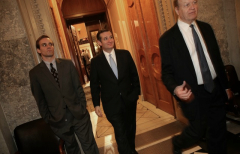

By AP/NewsOne Staff
WASHINGTON — Congress cleared a $1.1 trillion spending bill late Saturday night for President Barack Obama‘s signature after a day of Senate intrigue capped by a failed, largely symbolic Republican challenge to the administration’s new immigration policy.
Unlike last year, the budget passed, and avoided a government shut down.
The vote late Saturday night was 56-40 in favor of the measure, which funds nearly the entire government through the Sept. 30 end of the fiscal year. It also charts a new course for selected shaky pension plans covering more than 1 million retirees, including the possibility of benefit cuts.
The spending bill, which cleared the House on Thursday, was the main item left on Congress’ year-end agenda, and exposed fissures within both political parties in both houses.
It faced opposition from Democratic liberals upset about the repeal of a banking regulation and Republican conservatives unhappy that it failed to challenge Obama’s immigration moves.
While the legislation assures funding for nearly the entire government until next fall, it made an exception of the Department of Homeland Security. Money for the agency will run out on Feb. 27, when Republicans intend to try and force the president to roll back an immigration policy that removes the threat of deportation from millions of immigrants living in the United States illegally.
The legislation locks in spending levels negotiated in recent years between Republicans and Democrats, and includes a number of provisions that reflect the priorities of one party or the other, from the environment to abortion to the legalization of marijuana in the District of Columbia.
One, which drew vehement objections from the Democrats, would repeal a regulation imposed on banks in the wake of the near economic collapse of 2008. Critics called it a bailout for large financial institutions, but more than 70 House Democrats voted for it previously, and Obama made clear he didn’t view it as a deal-killer.
The pension provision was a bipartisan agreement that opens the door for the first time to benefit cuts for current retirees covered by multi-employer funds in shaky financial condition.
Supporters said it would protect retirement income to the maximum extent possible without also endangering the solvency of the government fund that guarantees multi-employer plans. Critics said it posed a threat to the pension recipients, and that it could also become a precedent for other pensioners.
Immigration was at the heart of the day’s events in the Senate.
Tea party-backed Texas Sen. Ted Cruz seized on the issue late Friday night when he tried to challenge the bill. That led swiftly to the unraveling of an informal bipartisan agreement to give the Senate the weekend off, with a vote on final passage of the bill deferred until early this coming week.
That, in turn, led Harry Reid, D-Nev., to call an all-day Senate session devoted almost exclusively to beginning time-consuming work on confirmation for 13 judicial appointees and 11 nominees to administration posts.



